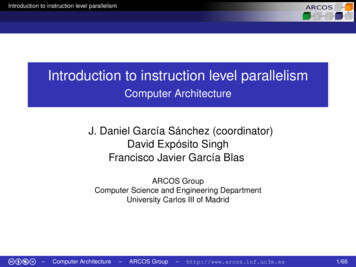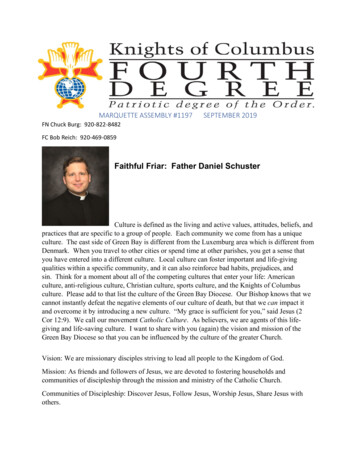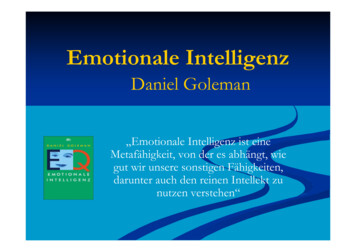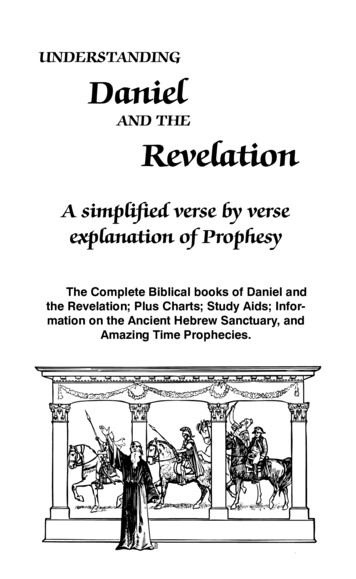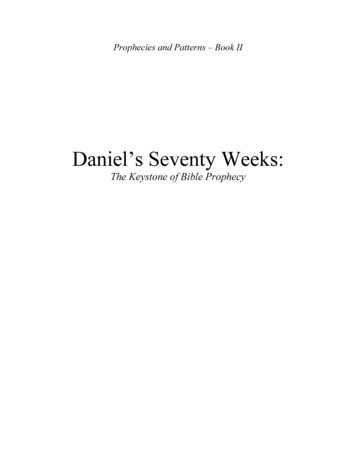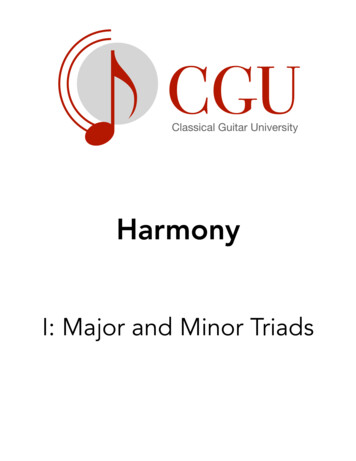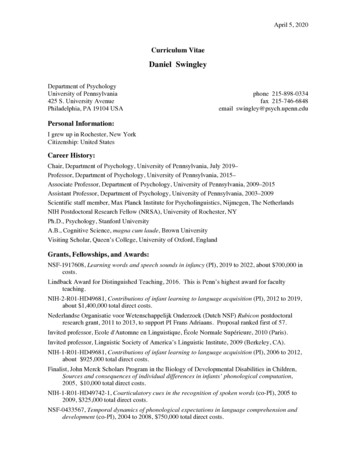
Transcription
April 5, 2020Curriculum VitaeDaniel SwingleyDepartment of PsychologyUniversity of Pennsylvania425 S. University AvenuePhiladelphia, PA 19104 USAphone 215-898-0334fax 215-746-6848email swingley@psych.upenn.eduPersonal Information:I grew up in Rochester, New YorkCitizenship: United StatesCareer History:Chair, Department of Psychology, University of Pennsylvania, July 2019–Professor, Department of Psychology, University of Pennsylvania, 2015–Associate Professor, Department of Psychology, University of Pennsylvania, 2009–2015Assistant Professor, Department of Psychology, University of Pennsylvania, 2003–2009Scientific staff member, Max Planck Institute for Psycholinguistics, Nijmegen, The NetherlandsNIH Postdoctoral Research Fellow (NRSA), University of Rochester, NYPh.D., Psychology, Stanford UniversityA.B., Cognitive Science, magna cum laude, Brown UniversityVisiting Scholar, Queen’s College, University of Oxford, EnglandGrants, Fellowships, and Awards:NSF-1917608, Learning words and speech sounds in infancy (PI), 2019 to 2022, about 700,000 incosts.Lindback Award for Distinguished Teaching, 2016. This is Penn’s highest award for facultyteaching.NIH-2-R01-HD49681, Contributions of infant learning to language acquisition (PI), 2012 to 2019,about 1,400,000 total direct costs.Nederlandse Organisatie voor Wetenschappelijk Onderzoek (Dutch NSF) Rubicon postdoctoralresearch grant, 2011 to 2013, to support PI Frans Adriaans. Proposal ranked first of 57.Invited professor, Ecole d'Automne en Linguistique, École Normale Supérieure, 2010 (Paris).Invited professor, Linguistic Society of America’s Linguistic Institute, 2009 (Berkeley, CA).NIH-1-R01-HD49681, Contributions of infant learning to language acquisition (PI), 2006 to 2012,about 925,000 total direct costs.Finalist, John Merck Scholars Program in the Biology of Developmental Disabilities in Children,Sources and consequences of individual differences in infants’ phonological computation,2005, 10,000 total direct costs.NIH-1-R01-HD49742-1, Coarticulatory cues in the recognition of spoken words (co-PI), 2005 to2009, 325,000 total direct costs.NSF-0433567, Temporal dynamics of phonological expectations in language comprehension anddevelopment (co-PI), 2004 to 2008, 750,000 total direct costs.
Daniel Swingleypage 2Nederlandse Organisatie voor Wetenschappelijk Onderzoek (Dutch NSF) Rubicon postdoctoralresearch grant, 2007 to 2009, to support PI Suzanne van der Feest.Nederlandse Organisatie voor Wetenschappelijk Onderzoek (Dutch NSF) grant, 2001 to 2005 (co-PIwith Dr. Rene Kager and Dr. Paula Fikkert); 2 PhDs plus 1 postdoc, salaries and other costs.National Institutes of Child Health and Human Development Fellowship (NRSA)National Science Foundation Predoctoral FellowshipPhi Beta Kappa, Brown UniversityTeaching Experience:University of Pennsylvania:Psychology 1, Introduction to Psychology (undergrad survey course; about 400 students)Psychology 281, Cognitive Development (undergraduate survey course; 85-100 students)Psychology 481, Language Acquisition (undergraduate seminar; about 20 students).Psychology 600, Proseminar in Cognitive Development (graduate survey; 20-30 students)Psychology 311 and 386, Research Experience in Perception: Perceptual Learning in Infancy(undergraduate research course; about 8 students)Psychology 739/211, Special Topics in Perception: Perceptual Learning (with Dr. Ben Backus;combined graduate and undergraduate seminar; about 12 students, half graduate students)University of Rochester:Brain and Cognitive Sciences 111: Foundations of Cognitive Science (undergraduate surveycourse; 60 students)Postdocs:Sho Tsuji (LSCP Paris PhD., 2016—2018), Marie Curie fellow. Experimental research on infantlanguage and infant social cognition. Now Asst. Prof. at the University of Tokyo,International Research Center for Neurointelligence.Yakov Kronrod (Univ. Maryland PhD., Linguistics, 2014), experimental and computationalcharacterization of phonetic category learning in infants and 2nd-language-learning adults.2014—2016. Now at Amazon AI in Palo Alto.Frans Adriaans (Utrecht University PhD., Linguistics, 2010), computer modeling of infant languageacquisition. 2011—2013. Now Asst. Prof. of Linguistics, Utrecht.Gary Lupyan (Carnegie-Mellon PhD., Psychology, 2008), interactions between words and conceptsin category learning. With Sharon Thompson-Schill. 2008–2010. Now Asst. Prof. ofPsychology, University of Wisconsin-Madison, 2010.Chandan Narayan (Michigan PhD., Linguistics, 2006), phonetic category learning. With JiahongYuan. 2006-2008. Now Asst. Prof. in Linguistics, University of Toronto.Suzanne van der Feest (Radboud Univ. Nijmegen PhD., Linguistics, 2007), developmentalphonology. 2007-2009. Now at CUNY.Sarah Creel (Rochester PhD., BCS, 2005), temporal effects in adults’ word learning, and phoneticsensitivity in children’s word recognition. With Delphine Dahan. 2005-2007. Now Assoc.Prof. in Cognitive Science, UCSD.Ph.D. students:Primary supervisor, Caroline Beech (2020—).
Daniel Swingleypage 3primary supervisor, Angelica Buerkin-Salgado (2013–).primary supervisor, Elika Bergelson (2008–2013), semantic knowledge of words in infancy. NSFpredoctoral fellow 2009-2012. Thesis won the (single) Dissertation Award of theInternational Society for Infant Studies. Now an assistant prof at Duke. Awarded an NIHEarly Investigator Award ( 1.25M). Cognitive Development Society’s Steve Reznick EarlyCareer Award in 2019, International Congress on Infant Studies Early Career Award in2020.primary supervisor, Carolyn Quam (2004–2010), children’s interpretation of phonetic information inword learning. NSF predoctoral fellow 2005–2008; NIH postdoc fellow, UCSD, 2010–2011; K00 awardee. Now Asst. Prof. of Speech and Hearing Sciences, Portland StateUniversity.primary supervisor, Christiane Dietrich (PhD, 2006), infants’ development of phonetic categories;infant speech perception. (At MPI for Psycholinguistics.)co-supervisor (with Dr. Roel Smits), Martijn Goudbeek (PhD, 2007), adults’ implicit and explicitlearning of auditory categories; mathematical modeling. (At MPI for Psycholinguistics; nowan assistant professor at Tilburg Univ. in the Netherlands.)other dissertation committees and advisory work at Penn: Marina Bedny (2006); Marc Egeth (chair;2007); Peter DeScioli (chair; 2008); Jared Minkel (2009); Daniel Drucker (2009); HilaryDingfelder (2012); Sarah Johnstone (2010); Josh Tauberer (2010) [in Linguistics], Hila Katz(2011), Gayeon Son [Linguistics] (2017), Caitlin Clements (2014--), Isaac Schamberg(2016), Emily Szkudlarek (2015--), Leah Wang (2019--).invited PhD opponent or jury member: Eeva Klintfors (2007), Stockholm University (adviserFrancisco Lacerda); Nicole Altvater-Mackensen (2010), Radboud Universiteit, Nijmegen(adviser Paula Fikkert); Louise Goyet (2010), Univ. Paris V (adviser Thierry Nazzi); PerrineBrusini (2012), Univ. Paris VI (adviser Anne Christophe); Sho Tsuji (2014), RadboudUniversiteit, Nijmegen (advisers Paula Fikkert, Anne Cutler, and Alejandrina Cristia);Thomas Schatz (2016), Univ. Paris VI (adviser Emmanuel Dupoux); Lena Forssén Renner(2017), Stockholm University (adviser Ulla Sundberg).Undergraduate Independent Study or Honors students:Jason Knies, 2019-20, consonant categorization in adults and in young toddlers.Joshua Nouriyelian, summer 2019 (PURM), similarity in adult-adult and adult-child speech.Sophia Heiser, 2019, repetition features in infant-directed speech.Jerry Lu, summer 2018 (PURM), acoustic similarity in Italian and Mandarin speech samples.Jasmine Raj, 2018-19, toddlers’ intuitions about phonological distinctions.Ajulu Adigwe, 2017, individual differences in second-language pronunciation.Lucy Guida, 2017, correlates of category learning ability.Sarah Eisler, 2015-2016, predicting individual differences in adult L2 speech-category learning.Ilana Ijzenman, 2015-2016, adults’ phonological intuitions.Jim Brighter, 2014-2015, learning of complex auditory categories.Claudia Alarcon, 2014-2015, phonetics of infant-directed Spanish.Ayla Taylor, 2014-2015, infant gaze to eyes and mouth while hearing speech.Till Poppels, Honors in Psychology (2012-2013), category learning in adults.Rachel Romeo, Honors in Psychology (2010-2011), longitudinal study of toddlers’ word recognition.Awarded a Fulbright and a Thouron Fellowship in 2011 to study speech development atUniversity College London. Harvard PhD in psychology, 2018.
Daniel Swingleypage 4Allison Britt, Honors in Psychology (2009-2010), phonological influences on toddlers’ wordlearning, a retrospective study examining infant-directed speech corpora and data on thecontents of the addressees’ vocabularies assessed longitudinally. The thesis won thePsychology Department’s Morris Viteles Award. After Penn, Moss Rehab. Rsch. Inst.Rachel Weinblatt, Honors in Psychology (2009-2010), experimental study of young children’s use ofphonological contrasts for word individuation using a violation-of-expectation method.Gabriella Garcia, Honors in Cognitive Science (2009-2010), experimental study of toddlers’interpretation of readily perceptible phonological distinctions.Nick Barr, independent study in Cognitive Science (2007), experimental study of adults’ ability tolearn foreign accents. Honors in Cognitive Science (2008) for an extension of this project.Tova Brooks, independent study in Computer Science (2007), modeling of vocabulary acquisitionthrough statistical clustering.Professional Service Activities:Associate editor, Language Learning and Development (2016–)Editorial boardsDevelopmental Science (2013–)Psychological Science (2009–2012)Journal of Memory and Language (2006–2009)Infancy (2008–2014)Language Learning and Development (2003–)Guest editor, themed issues of Language Learning and Development (2009, 2011)National / international grant review serviceNIH Language and Communication (LCOM) panel, 2006; panel member 2010-2014NIH fellowship application review panel, 2008NSF ad hoc grant reviewer 2005, 2006, 2007, 2010; declined panel membership 2007Nederlandse Organizatie voor Wetenschappelijk Onderzoek (NWO; Dutch NSF) ad hoc grantreviewer, several occasionsEuropean Research Council, ad hoc reviewer 2017, 2018l’Agence Nationale de la Recherche (ANR: France) ad hoc grant reviewer 2009, 2012, 2013,2014, 2017, 2018, 2020; invited triage (primary) reviewer on panel, 2013-2014, 2016,2018Czech Science Foundation, ad hoc grant reviewer 2017Social Sciences and Humanities Research Council (SSHRC; Canada) ad hoc reviewer 2010Economic and Social Research Council (ESRC; UK) ad hoc grant reviewer 2009Nuffield Foundation (UK) ad hoc reviewer 2010; Leverhulme Trust, ad hoc reviewer 2011Deutsche Forschungsgemeinschaft (DFG; German NSF) ad hoc grant reviewer 2016Ad hoc journal reviews: Applied Psycholinguistics Child Development Cognition Cognitive Development Cognitive Psychology Cognitive Science Current Directions inPsychological Science Developmental Psychology Developmental Science Developmental Review Infancy
Daniel Swingleypage 5 Infant Behavior andDevelopment Journal of Child Language Journal of ExperimentalChild Psychology Journal of Memory andLanguage Journal of Speech, Language,and Hearing Research Journal of the AcousticalSociety of America Language and CognitiveProcesses Language and Speech Language Learning andDevelopment Memory and Cognition PNAS USA Psychological Bulletin Psychological Science Psychological Review Science Speech Communication Trends in Cognitive SciencesSociety service, conference reviews, pre-publication book reviews, conference administration:Treasurer, Society for Language Development (2008–)Abstract and book reviews: Routledge Press, MIT Press, Psychology Press;Boston Univ. Conference on Language Development; Society for Research on ChildDevelopment Biennial Meeting; Program Committee, Cognitive Science Society AnnualMeeting; International Conference on Infant Studies Biennial MeetingOrganized annual full-day symposium of the Society for Language Development (November,2007), Generalization in Language Learning (speakers: Janet Pierrehumbert, JoshuaTenenbaum, Steven Pinker), at Boston University. About 175 attendees.Again in 2008: organized full-day symposium of the Society for Language Development(November, 2008): Slow Mapping, Fast Mapping: Children’s Word Learning 30 YearsAfter Carey & Bartlett 1978 (speakers: Susan Carey, Linda Smith, Susan Gelman).Again in 2009: organized full-day symposium of the Society for Language Development(November, 2009): Interactions between early cognitive development and languageacquisition (speakers: Laura Schulz, Gergely Csibra, and Renée Baillargeon).Again in 2010: organized full-day symposium of the Society for Language Development(November, 2010): Cognition and Language (speakers: Noam Chomsky, Randy Gallistel)Administrative service at Penn:Univ.MindCORE initiative faculty advisory board, 2019–Dean’s Planning and Priorities Committee (Arts & Sciences), 2018–Natural Sciences and Mathematics Education Committee, 2018–2019Undergraduate Education Committee, 2011–2013; 2017–2019Teaching awards committee, 2019Graduate Council of the Faculties, 2013–2016Quaker Days speaker, 2015, 2016Human Research Advisory Committee, 2013–2017Psychology representative to university IRB, 2007–2013Dept.Department Chair, 2019–2023Director of Undergraduate Studies, 2018–2019Various tenure review committees, 2015–Faculty Search Committee, 2013-2014Graduate Admissions Committee, 2010
Daniel Swingleypage 6Psychology Colloquium Committee 2003; chair 2004–2010Psychology Chair’s Advisory Committee, 2007, 2014Professional Memberships:American Psychological Association, 1993–presentAmerican Psychological Society, 1997–presentAmerican Speech and Hearing Association, 2003–presentInternational Society for Infant Studies, 1997–presentSociety for Language Development, 2005–presentSociety for Research in Child Development, 1993–presentPublications under review:Humphrey, C., & Swingley, D. (under review). Regression analysis of proportion outcomes withrandom effects.Buerkin-Pontrelli & Swingley, D. (under review). When do labels selectively guide infants'categorization behavior?Peer-reviewed publications:ISI h-index: 24; Google h: 28Swingley, D. (2019). Learning phonology from surface distributions, considering Dutch and Englishvowel duration. Language Learning and Development, 15, 199-216. doi: 10.1080/15475441.2018.1562927Swingley, D., & Van der Feest, S. (2019). A crosslinguistic examination of toddlers' interpretation ofvowel duration. Infancy. doi: 10.1111/infa.12280Swingley, D., & Alarcon, C. (2018). Lexical learning may contribute to phonetic learning in infants:a corpus analysis of maternal Spanish. Cognitive Science. doi: 10.1111/cogs.12620.Bergelson, E., & Swingley, D. (2017). Young infants’ word comprehension given unfamiliar talkersor altered pronunciations. Child Development, doi: 10.1111/cdev.12888.Adriaans, F., & Swingley, D. (2017). Prosodic exaggeration within infant-directed speech:consequences for vowel learnability. Journal of the Acoustical Society of America.Swingley, D., & Humphrey, C. (2017). Quantitative linguistic predictors of infants’ learning ofspecific English words. Child Development, doi: 10.1111/cdev.12731.Swingley, D. (2017). Commentary: The infant's developmental path in phonological acquisition.British Journal of Psychology, 108, 28-30. doi 10.1111/bjop.12215Swingley, D. (2016). Two-year-olds interpret novel phonological neighbors as familiar words.Developmental Psychology. 52, 1011-1023. doi 10.1037/dev0000114.Dautriche, I., Swingley, D., & Christophe, A. (2015). Learning novel phonological neighbors:syntactic category matters. Cognition, doi 10.1016/j.bcognition.2015.06.003Bergelson, E., & Swingley, D. (2014). Early word comprehension in infants: replication andextension. Language Learning and Development.Quam, C., & Swingley, D. (2014). Bunny? Banana? Processing of lexical-stress cues in youngchildren. Journal of Experimental Child Psychology, 123, 73-89. dx.doi.org/10.1016/j.jecp.2014.01.010
Daniel Swingleypage 7Bergelson, E., & Swingley, D. (2013). Social and Environmental Contributors to Infant WordLearning. In M. Knauff, M. Pauen, N. Sebanz, & I. Wachsmuth (Eds.), Proceedings of the 35thAnnual Conference of the Cognitive Science Society, 187-192. Austin, TX: Cognitive ScienceSociety.Bergelson, E., & Swingley, D. (2013). The acquisition of abstract words by young infants.Cognition, 127, 391-397.Bergelson, E., & Swingley, D. (2013). Young toddlers’ word comprehension is flexible and efficient.PLoS ONE, 8, 1-9, doi:10.1371/ journal.pone.0073359Bergelson, E., & Swingley, D. (2012). At 6–9 months, human infants know the meanings of manycommon nouns. Proceedings of the National Academy of Sciences of the USA, 109, 3253-3258.Lupyan, G., & Swingley, D. (2012). Self-directed speech affects visual search performance.Quarterly Journal of Experimental Psychology, 65, 1068-1085.Quam, C., & Swingley, D. (2012). Development in children’s interpretation of pitch cues toemotions. Child Development, 83, 246-250.Adriaans, F., & Swingley, D. (2012). Distributional learning of vowel categories is supported byprosody in infant-directed speech. In N. Miyake, D. Peebles, & R. P. Cooper (Eds.),Proceedings of the 34th Annual Conference of the Cognitive Science Society (pp. 72-77).Austin, TX: Cognitive Science Society.Van der Feest, S.V.H., & Swingley, D. (2011). Dutch and English listeners’ interpretation of vowelduration. JASA Express Letters, 129, EL57-63.Quam, C., & Swingley, D. (2010). Phonological knowledge guides two-year-olds’ and adults’interpretation of salient pitch contours in word learning. Journal of Memory and Language, 62,135-150.Lupyan, G., Thompson-Schill, S.L., & Swingley, D. (2010). Conceptual penetration of visualprocessing. Psychological Science, 21, 682-691.Swingley, D. (2009). Contributions of infant word learning to language development. PhilosophicalTransactions of the Royal Society B, 364, 3617-3622.Goudbeek, M., Swingley, D., & Smits, R. (2009). Supervised and unsupervised learning ofmultidimensional auditory categories. Journal of Experimental Psychology: HumanPerception and Performance, 35, 1913-1933.Swingley, D. (2009). Onsets and codas in 1.5-year-olds’ word recognition. Journal of Memory andLanguage. 60, 252-269.Ramon-Casas, M., *Swingley, D., Sebastián-Gallés, N., & Bosch, L. (2009). Vowel categorizationduring word recognition in bilingual toddlers. Cognitive Psychology, 59, 96-121.(*Corresponding author)Yoshida, K., Fennell, C., Swingley, D., & Werker, J.F. (2009). 14-month-olds learn phoneticallysimilar words. Developmental Science, 12, 412-418.Swingley, D. (2008). The roots of the early vocabulary in infants’ learning from speech. CurrentDirections in Psychological Science, 17, 308-312.Dietrich, C., *Swingley, D., & Werker, J.F. (2007). Native language governs interpretation of salientspeech sound differences at 18 months. Proceedings of the National Academy of Sciences ofthe USA, 104, 16027-16031. (*Corresponding author)Swingley, D. (2007). Lexical exposure and word-form encoding in one-year-olds. DevelopmentalPsychology, 43, 454-464.
Daniel Swingleypage 8Swingley, D., & Aslin, R.N. (2007). Lexical competition in young children’s word learning.Cognitive Psychology, 54, 99-132.Swingley, D. (2005). 11-month-olds’ knowledge of how familiar words sound. DevelopmentalScience, 8, 432-443.Swingley, D. (2005). Statistical clustering and the contents of the infant vocabulary. CognitivePsychology 50, 86-132.Swingley, D. (2003). Phonetic detail in the developing lexicon. Language and Speech, 46, 265-294.Swingley, D. and Aslin, R.N. (2002). Lexical neighborhoods and the word-form representations of14-month-olds. Psychological Science 13, 480-484.Swingley, D. and Fernald, A. (2002). Recognition of words referring to present and absent objectsby 24-month-olds. Journal of Memory and Language 46, 3
Jerry Lu, summer 2018 (PURM), acoustic similarity in Italian and Mandarin speech samples. Jasmine Raj, 2018-19, toddlers’ intuitions about phonological distinctions. Ajulu Adigwe, 2017, individual differences in second-language pronunciation. L


